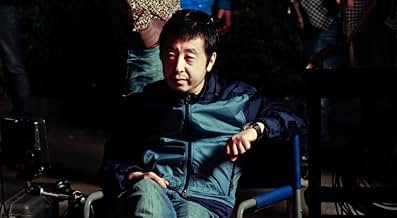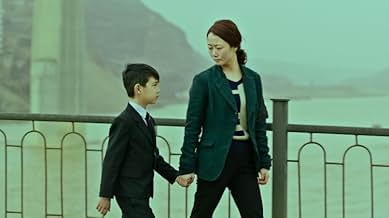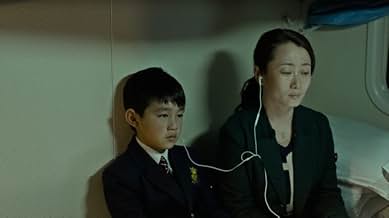IMDb RATING
6.9/10
6.8K
YOUR RATING
The life of Tao, and those close to her, is explored in three different time periods: 1999, 2014, and 2025.The life of Tao, and those close to her, is explored in three different time periods: 1999, 2014, and 2025.The life of Tao, and those close to her, is explored in three different time periods: 1999, 2014, and 2025.
- Awards
- 26 wins & 42 nominations total
Yi Zhang
- Zhang Jinsheng
- (as Zhang Yi)
Zijian Dong
- Zhang Daole aka Dollar
- (as Dong Zijian)
- Director
- Writer
- All cast & crew
- Production, box office & more at IMDbPro
Featured reviews
Mountains May Depart, directed by Zhangke Jia, is a very fine Chinese drama, whose timeline spans some twenty-five years from the past, to the present, to the future, representing China in the modern age and possibly where it's headed. It is something that's quite unique and interesting. Jia was also the director of a movie I saw a few years ago called A Touch of Sin, and while I remember admiring that film (which is of a considerably darker subject matter than this one), it left me feeling a little cold, while I enjoyed the experience of Mountains May Depart more.
The main character in story, who is connected in one way or another to almost every other prominent person, is a woman named Tao Zhao, played by Shen Tao. She is the heart of the film even during much of the parts she's not in, playing it with empathy and truth in her journey, a very fine performance. There are two other good performances by Yi Zhang and Jing Dong Liang, and these three main character evolve significantly through time. But the main strength is a story dealing themes of class and materialism, and the cost of progress, put together in a way worthy of these universal human subjects.
Mountains does have some issues in the final of the three acts as it becomes a little odd--odd in a way that that might have worked with different material, but doesn't quite fit with the rest of this film. Still, this is an overall fascinating and moving experience, well-acted and written, making itself very relatable and is an impressive way to view these people over time.
The main character in story, who is connected in one way or another to almost every other prominent person, is a woman named Tao Zhao, played by Shen Tao. She is the heart of the film even during much of the parts she's not in, playing it with empathy and truth in her journey, a very fine performance. There are two other good performances by Yi Zhang and Jing Dong Liang, and these three main character evolve significantly through time. But the main strength is a story dealing themes of class and materialism, and the cost of progress, put together in a way worthy of these universal human subjects.
Mountains does have some issues in the final of the three acts as it becomes a little odd--odd in a way that that might have worked with different material, but doesn't quite fit with the rest of this film. Still, this is an overall fascinating and moving experience, well-acted and written, making itself very relatable and is an impressive way to view these people over time.
Mountains May Depart starts on perhaps my favourite opening shot of the year. Kicking it off with the Pet Shop Boys' vibrant song "Go West," we're straight in the middle of a dance routine with a room full of people clumsily bopping in sync. It's infectious and filled with unbridled hope and joy. Unfortunately, it's downhill from here, though the film is never aiming for the same type of exuberance. I'm not familiar with Jia Zhangke or his following – Walter Salles apparently has a hotly anticipated documentary about the director at this festival – but Mountains May Depart seems like an endearing and accessible introduction. Telling three stories in three separate time periods, I do enjoy the way it explores causality in how these small relationships and dramas at one time can feed into a dilemma 25 years later.
The first story, set during the turn of the century in 1999 when Chinese capitalism was healthy, follows a love triangle between Tao, an aerobics instructor, Zhang, an egotistic entrepreneur, and Liangzi, a man who works for Zhang. The three hang out as friends but Zhang can't bear the idea of Tao getting close to Liangzi and despite emotional logic, it's social economical pressures that make decisions. Cut to 2014, Tao and her beau have divorced and she's now estranged from her son. Upon the death of her father, her son is forced to visit and she must make the decision of how connected she should be to him throughout his life. Then off to an imagined Australia in 2025, her son doesn't remember her and currently struggles with his relationship with his father where they now have a language barrier. With the help of a teacher he grows attached to, he goes in search for Tao.
Each section of the film is approached in a different way, reminiscent of the way last year's The Grand Budapest Hotel and Mommy played with ratios. The first section is a tight 4:3, the second is a full frame, and the third is widescreen. However, these feel like they represent the period and the environment moreso than the character's emotions, with exception to the mid- section, which ideally captures Tao's regret and longing. It's a mixed bag depending on the talent, with some tender moments landing strong and some clumsily misguided, the latter most prominent in the last section. That first section has a bait and switch for the decades long heartache that the seemingly innocent love triangle causes. The theme of how people drift apart no matter how close they are resonates but it's unbearably melancholic without Zhangke offering much of a satisfying a silver lining.
It's a shame that despite the film's strengths it has too many loose ends and unnecessary moments that don't appear to add to the character arcs or the themes. With a 25 year story like this where no single character carries us through the whole film, every moment has to count to something. There's little justification as to why the third section is in glorious widescreen and set in Australia, but perhaps this just speaks to how disconnected it is from the rest of the film. While mostly drenched in Chinese culture, I wish Zhangke didn't resort to certain American clichés such as sad montages of characters having deep thoughts set to music. However, with those time gaps, Zhangke does harness a powerful nostalgic through just a few song motifs carried through all three sections that are well executed. Both disarmingly simple and complex, his ambition is admirable, but it doesn't quite reach the potential that this expanse allows it to travel.
7/10
Read more @ The Awards Circuit (http://www.awardscircuit.com/)
The first story, set during the turn of the century in 1999 when Chinese capitalism was healthy, follows a love triangle between Tao, an aerobics instructor, Zhang, an egotistic entrepreneur, and Liangzi, a man who works for Zhang. The three hang out as friends but Zhang can't bear the idea of Tao getting close to Liangzi and despite emotional logic, it's social economical pressures that make decisions. Cut to 2014, Tao and her beau have divorced and she's now estranged from her son. Upon the death of her father, her son is forced to visit and she must make the decision of how connected she should be to him throughout his life. Then off to an imagined Australia in 2025, her son doesn't remember her and currently struggles with his relationship with his father where they now have a language barrier. With the help of a teacher he grows attached to, he goes in search for Tao.
Each section of the film is approached in a different way, reminiscent of the way last year's The Grand Budapest Hotel and Mommy played with ratios. The first section is a tight 4:3, the second is a full frame, and the third is widescreen. However, these feel like they represent the period and the environment moreso than the character's emotions, with exception to the mid- section, which ideally captures Tao's regret and longing. It's a mixed bag depending on the talent, with some tender moments landing strong and some clumsily misguided, the latter most prominent in the last section. That first section has a bait and switch for the decades long heartache that the seemingly innocent love triangle causes. The theme of how people drift apart no matter how close they are resonates but it's unbearably melancholic without Zhangke offering much of a satisfying a silver lining.
It's a shame that despite the film's strengths it has too many loose ends and unnecessary moments that don't appear to add to the character arcs or the themes. With a 25 year story like this where no single character carries us through the whole film, every moment has to count to something. There's little justification as to why the third section is in glorious widescreen and set in Australia, but perhaps this just speaks to how disconnected it is from the rest of the film. While mostly drenched in Chinese culture, I wish Zhangke didn't resort to certain American clichés such as sad montages of characters having deep thoughts set to music. However, with those time gaps, Zhangke does harness a powerful nostalgic through just a few song motifs carried through all three sections that are well executed. Both disarmingly simple and complex, his ambition is admirable, but it doesn't quite reach the potential that this expanse allows it to travel.
7/10
Read more @ The Awards Circuit (http://www.awardscircuit.com/)
Director Zhangke Jia is not afraid to tackle the problems of modern China, and 'Mountains May Depart' is no exception. The film touches upon issues such as growing inequality, poor working conditions and corruption, but the central theme is the price the country is prepared to pay for its obsession with material progress.
The film is set in Fenyang, a northern coal mining city and the director's hometown. In 1999, at the eve of the new millennium, eighteen year old Tao (played by the director's wife Tao Zhao) has to choose between two suitors: the honest but ordinary coal miner Liangzi and the flashy bragger Zhang. She sees right through Zhang's bravado, but can't resist the promise of a better life, symbolized by his red Volkswagen, 'perfect for the next century'. Liangzi feels humiliated and leaves town.
Fifteen years later, Tao is well-off, but divorced and unhappy. Her seven year old son is living the good life with his father in Shanghai. Liangzi, in the mean time, is terribly ill and returns to Fenyang. Filled with remorse, Tao helps him financially but doesn't seem to be able to relate to him on an emotional basis.
Flash-forward another ten years into the future, and Tao's son is living with his father in Australia. He had to leave China, it turns out, because of anti-corruption campaigns. The boy is a spoilt and clueless brat, who refuses to speak Chinese to his father, but finds some emotional warmth with his Chinese teacher.
The first two parts of the film are excellent. Tao's moral choices, the contrast between progress and tradition, the power of money - it's all shown in a beautiful heartfelt way. The director anchors the story with recurring images, like a tall pagoda on the banks of the Yellow River, and spices it with small symbolic items like dumplings and keys. An interesting feature is the changing aspect ratio: in the first episode the screen is almost square, and it widens until it is widescreen in the last episode. Another feature is the way dialogues are filmed: repeatedly the director frames only one participant. And a third peculiarity are some high-impact scenes without a clear meaning or function in the story: a crashing military plane, a coal truck losing some of its cargo, a nervous caged tiger.
The sad thing about this movie is that the third part is very different from the first two parts, and lacks the quality of it. Not only are we introduced to different protagonists, also in this part the dialogue and acting are clumsy and unnatural, the story lacks focus and the scenes seem pointless. It's as if the director loses his golden touch when the story leaves China.
Still, in this last episode, the message is hammered home: the strive for material wealth leads to emotional poverty.
The film is set in Fenyang, a northern coal mining city and the director's hometown. In 1999, at the eve of the new millennium, eighteen year old Tao (played by the director's wife Tao Zhao) has to choose between two suitors: the honest but ordinary coal miner Liangzi and the flashy bragger Zhang. She sees right through Zhang's bravado, but can't resist the promise of a better life, symbolized by his red Volkswagen, 'perfect for the next century'. Liangzi feels humiliated and leaves town.
Fifteen years later, Tao is well-off, but divorced and unhappy. Her seven year old son is living the good life with his father in Shanghai. Liangzi, in the mean time, is terribly ill and returns to Fenyang. Filled with remorse, Tao helps him financially but doesn't seem to be able to relate to him on an emotional basis.
Flash-forward another ten years into the future, and Tao's son is living with his father in Australia. He had to leave China, it turns out, because of anti-corruption campaigns. The boy is a spoilt and clueless brat, who refuses to speak Chinese to his father, but finds some emotional warmth with his Chinese teacher.
The first two parts of the film are excellent. Tao's moral choices, the contrast between progress and tradition, the power of money - it's all shown in a beautiful heartfelt way. The director anchors the story with recurring images, like a tall pagoda on the banks of the Yellow River, and spices it with small symbolic items like dumplings and keys. An interesting feature is the changing aspect ratio: in the first episode the screen is almost square, and it widens until it is widescreen in the last episode. Another feature is the way dialogues are filmed: repeatedly the director frames only one participant. And a third peculiarity are some high-impact scenes without a clear meaning or function in the story: a crashing military plane, a coal truck losing some of its cargo, a nervous caged tiger.
The sad thing about this movie is that the third part is very different from the first two parts, and lacks the quality of it. Not only are we introduced to different protagonists, also in this part the dialogue and acting are clumsy and unnatural, the story lacks focus and the scenes seem pointless. It's as if the director loses his golden touch when the story leaves China.
Still, in this last episode, the message is hammered home: the strive for material wealth leads to emotional poverty.
"Mountains May Depart" (aka "Shan he gu ren") is an odd experience of a movie. Why? Well, because it is on one hand a very nicely told story with three different story lines, but on the other hand the movie is excruciatingly slow paced to the point of where it tests the will to continue in the audience.
There is no doubt that director Zhangke Jia managed to pull off a very good job here in terms of bringing the story to life on the screen. And it is a very unique and beautiful story told, one that sinks in deep and sticks with you. Just a shame that it was done in such a slow and monotone pace.
The story is divided into three different segments, all of which are interwoven with one another in one or more aspects. And that is what makes the story so interesting. That, and because the story lines and subplots were interesting, and the characters portrayed in the movie were vibrant, colorful and realistic - giving the audience someone to relate to and identify with. Of course, all three stories were not equally great, and the audience will like one story better than the other. Personally, I enjoyed the first story centered on Shen Tao the most.
As for the cast, well I can say that they had indeed done a great job in the casting process and gotten some really good talents to star in the movie. I was especially impressed with Tao Zhao's performance, and Sylvia Chang also really brought something good to the movie with her performance.
While "Mountains May Depart" is without a doubt a beautiful movie, then it just lacked that particular ingredient to make the movie unique. But it is definitely well worth a viewing if you enjoy a good drama with a well-written storyline. However, keep in mind that the pacing of the movie is slow, very, very slow.
There is no doubt that director Zhangke Jia managed to pull off a very good job here in terms of bringing the story to life on the screen. And it is a very unique and beautiful story told, one that sinks in deep and sticks with you. Just a shame that it was done in such a slow and monotone pace.
The story is divided into three different segments, all of which are interwoven with one another in one or more aspects. And that is what makes the story so interesting. That, and because the story lines and subplots were interesting, and the characters portrayed in the movie were vibrant, colorful and realistic - giving the audience someone to relate to and identify with. Of course, all three stories were not equally great, and the audience will like one story better than the other. Personally, I enjoyed the first story centered on Shen Tao the most.
As for the cast, well I can say that they had indeed done a great job in the casting process and gotten some really good talents to star in the movie. I was especially impressed with Tao Zhao's performance, and Sylvia Chang also really brought something good to the movie with her performance.
While "Mountains May Depart" is without a doubt a beautiful movie, then it just lacked that particular ingredient to make the movie unique. But it is definitely well worth a viewing if you enjoy a good drama with a well-written storyline. However, keep in mind that the pacing of the movie is slow, very, very slow.
When everybody around me liked the director's previous film 'A Touch of Sin', I didn't. As a film fanatic, reject such kind of film is not an easy job without giving a proper reason. I thought that was a missed opportunity. I surely like art films, not the boring one like those aimlessly narrated. I really loved some of the scenes there, but here it was completely different. Most importantly, anybody would understand what the film is trying to say without trying too hard.
This is a theme where the China's rise was revealed from the three people's personal life perspective that was categorised to the three generations or the timelines. That's not it, the communism was also highlighted, how it held back the people's freedom. The writer was really smart to smoothly disclosing that to the world. I mean the film never dragged the China's ruling party or its system, but all were told from its character who struggled and if you use your brain, you will get it why.
The narration was divided into three episodes. The first one takes place in the year 1999, in a small town somewhere in the China which is economically backward. The story follows a young woman named Tao, who is caught in a love triangle. But for the practical reason, she has to choose one of them and when she does, the other guy leaves the town with the heartbroken. This is the foundation, that dragged for nearly 40 minutes. Obviously slow, but very realistic approach.
I grew up in the 90s, my country was not much different than what's in this film was shown. So I liked the atmosphere, all those the 90s set, the automobiles, lifestyle, the landscapes of the small towns et cetera taken me back to that time. But the thing is, it was China, society and culturally different. Anyway, it was past and what follows are totally flips the narration, including the perspective.
"You know the hardest thing, about love is caring."
The second episode takes place in the year 2014, which is something like the present. It reveals what's the status of all the main three characters, like where they're economically standing and the personal life struggles. Tao's married life did not go well and her son is around ten years old who visits her from Shanghai. The one who left the town is now returned and battling for his life for some reason.
In the last 15 years, the China significantly changed and still, this entire part is set in the same town which is now economically moved forward. Like the changing urban landscape, how these characters too changed were what focused on this section.
Then comes the final episode where it is now in the year 2025, that takes place somewhere in the Australia. The perspective was changed, the little boy is now in his 20s, seems lost is root. With his behaviour, you would notice that his lack of knowledge about his ancestors. He who has the differences with his father, decides to make his life as he wanted. That is why the parents should take responsibility to teach their children all the good things about their culture and traditions, and to carry on, it's up to them. Because losing one's identity could lead to the failures in the life.
This is the part I liked better. Because it was something like what I encountered in my life. Most of the childhood memories that returns after we're grown-up as the deja vu, like the history repeating itself. Here for pointing out the freedom one to buy a gun was indirectly hit the communism. I mean gun was not a threat, it was just an expressed how it affects people in all the similar circumstances. I meant, what something was hidden brings more eagerness for us to know about it than those are in the out. So forcing something on people is sometime is a bad idea.
All the actors were good, but apart from the slow screenplay, I liked the idea of this film. There are some other similar films, like how different generations behave and now this is among them, yet not the best out of all of them. Very much watchable, only if you are capable of handling slow drag. If you know this director very well or the fan of his works, you will find it a pretty interesting film. I won't recommend it, but I also won't either suggest you to skip it.
7.5/10
This is a theme where the China's rise was revealed from the three people's personal life perspective that was categorised to the three generations or the timelines. That's not it, the communism was also highlighted, how it held back the people's freedom. The writer was really smart to smoothly disclosing that to the world. I mean the film never dragged the China's ruling party or its system, but all were told from its character who struggled and if you use your brain, you will get it why.
The narration was divided into three episodes. The first one takes place in the year 1999, in a small town somewhere in the China which is economically backward. The story follows a young woman named Tao, who is caught in a love triangle. But for the practical reason, she has to choose one of them and when she does, the other guy leaves the town with the heartbroken. This is the foundation, that dragged for nearly 40 minutes. Obviously slow, but very realistic approach.
I grew up in the 90s, my country was not much different than what's in this film was shown. So I liked the atmosphere, all those the 90s set, the automobiles, lifestyle, the landscapes of the small towns et cetera taken me back to that time. But the thing is, it was China, society and culturally different. Anyway, it was past and what follows are totally flips the narration, including the perspective.
"You know the hardest thing, about love is caring."
The second episode takes place in the year 2014, which is something like the present. It reveals what's the status of all the main three characters, like where they're economically standing and the personal life struggles. Tao's married life did not go well and her son is around ten years old who visits her from Shanghai. The one who left the town is now returned and battling for his life for some reason.
In the last 15 years, the China significantly changed and still, this entire part is set in the same town which is now economically moved forward. Like the changing urban landscape, how these characters too changed were what focused on this section.
Then comes the final episode where it is now in the year 2025, that takes place somewhere in the Australia. The perspective was changed, the little boy is now in his 20s, seems lost is root. With his behaviour, you would notice that his lack of knowledge about his ancestors. He who has the differences with his father, decides to make his life as he wanted. That is why the parents should take responsibility to teach their children all the good things about their culture and traditions, and to carry on, it's up to them. Because losing one's identity could lead to the failures in the life.
This is the part I liked better. Because it was something like what I encountered in my life. Most of the childhood memories that returns after we're grown-up as the deja vu, like the history repeating itself. Here for pointing out the freedom one to buy a gun was indirectly hit the communism. I mean gun was not a threat, it was just an expressed how it affects people in all the similar circumstances. I meant, what something was hidden brings more eagerness for us to know about it than those are in the out. So forcing something on people is sometime is a bad idea.
All the actors were good, but apart from the slow screenplay, I liked the idea of this film. There are some other similar films, like how different generations behave and now this is among them, yet not the best out of all of them. Very much watchable, only if you are capable of handling slow drag. If you know this director very well or the fan of his works, you will find it a pretty interesting film. I won't recommend it, but I also won't either suggest you to skip it.
7.5/10
Did you know
- TriviaSome sequences (in the 1999 segment) were filmed by the director and the cinematographer back in 2001.
- GoofsThe young boy who plays Tao's son in 2014 is also part of the crowd of children that watches her perform at the new year's celebrations in 1999.
- Crazy creditsThe title appears more than forty minutes after the beginning of the movie.
- SoundtracksGo West
Written by Henri Belolo, Jacques Morali and Victor Willis, Neil Tennant and Chris Lowe
Performed by Pet Shop Boys
- How long is Mountains May Depart?Powered by Alexa
Details
- Release date
- Countries of origin
- Official site
- Languages
- Also known as
- Mountains May Depart
- Filming locations
- Fenyang, Shanxi, China(Tao's home town)
- Production companies
- See more company credits at IMDbPro
Box office
- Gross US & Canada
- $82,913
- Opening weekend US & Canada
- $5,550
- Feb 14, 2016
- Gross worldwide
- $5,215,660
- Runtime
- 2h 6m(126 min)
- Color
- Sound mix
Contribute to this page
Suggest an edit or add missing content















